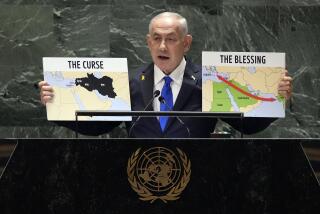End Illusions, Shultz Urges Mideast : No Winner-Take-All Solutions, He Warns Israel, Arabs
- Share via
CAIRO — Secretary of State George P. Shultz, sounding a bit frustrated at the very start of his latest Middle East shuttle mission, said Friday that the Arab-Israeli dispute can be resolved but only if both sides abandon “self-destructive” illusions and stop demanding winner-take-all solutions.
“The continuation of the conflict today stems from the inability of Arabs and Israelis to lay aside prejudices, hatred and overblown dreams,” Shultz said as he arrived in Egypt to begin a five-day round of talks that will also take him to Jerusalem, Amman, Jordan, and Damascus, Syria.
Talking to reporters aboard his U.S. Air Force jet on a flight from London, Shultz said his five-page Cairo arrival statement contains “the basic message that we are trying to deliver out here.”
Sharing the Blame
In effect, the message was that Arabs and Israelis share the blame for the current impasse, which can be broken only by new ways of thinking--perhaps even abandoning the historical definitions of sovereignty in which only one nation at a time can control a particular plot of land.
He conceded, however, that months of intensive diplomacy have not resulted in any measurable progress toward an end to a conflict that has been raging in its present form for 40 years and, with only slight variations, has been fought for centuries.
“I don’t have any particular indication of movement anywhere,” Shultz said. “But that doesn’t mean I should stop. You have to be willing to work against the odds.”
Sticks to Basic Proposal
Shultz said he has not changed his basic proposal, which calls for an international conference to provide a forum for direct negotiations between Israel and its Arab adversaries. He envisions a conference that would have no power to impose a settlement or to veto anything acceptable to the principal parties.
But the Arab states insist that the conference must have powers of its own. The Soviet Union also has balked at attending a conference that would have no authority.
Shultz said that during the just-ended Moscow summit, Soviet officials indicated a slight movement in the direction of the American approach. Now, he said, Soviet spokesmen say the conference should be “effective,” a change from their earlier insistence that it should be “authoritative.”
Softening of Demand
He said Soviet officials told him the change was intended to signal a weakening of Moscow’s demand for a conference with genuine powers. But he said the Soviets are not yet ready to endorse his proposal.
In his theme-setting statement, Shultz said Arabs and Israelis both have legitimate claims to the land between the Jordan River and the Mediterranean Sea--Israel, the West Bank and the Gaza Strip. And he asserted there is room enough for both.
“The fate of Zionism and Palestinian nationalism are interdependent, although many on both sides refuse to recognize this,” he said.
“Arabs and Israelis are not engaged in a winner-take-all competition,” he added. “A fair settlement is possible even though people have difficulty conceiving how to achieve it.”
Vague on Implementation
Shultz himself was vague about the way he believes sovereignty can be shared between Israelis and Palestinians without partitioning the land into separate states. Both Israel and the United States have consistently rejected this step in recent years, and the Arab world turned it down when the United Nations suggested it in 1947.
“What you regard, legitimately and necessarily, as sovereign territory in today’s world . . . is less and less kind of airtight,” Shultz told reporters. “No sovereign has the ability to completely control its borders. . . . Weapons of war can come across those borders in new and different ways. That means the border and the whole sense of sovereignty of 100 years ago in the political literature is necessarily different than it is today.”
Shultz’s comments received a warm welcome in Egypt, and Foreign Minister Esmat Abdel Meguid stood beside Shultz as he read his statement.
‘Supporting His Endeavors’
“We are here in Egypt totally supporting his endeavors,” the foreign minister said as Shultz completed his remarks. “I can assure him we will keep on, and we wish him success.”
But Egypt is only a minor player in the Arab-Israeli conflict because the 1978 Egypt-Israel peace agreement removed the Cairo government from the dispute. Like the United States, Egypt can try to use its influence to bring other parties together, but it can do little more than that.
The main parties to the conflict are far more skeptical of Shultz’s efforts. Israel’s coalition government is split on the proposal, with Prime Minister Yitzhak Shamir opposing it and Foreign Minister Shimon Peres favoring it. However, as a practical matter, Shamir’s opposition is enough to prevent Israel from entering negotiations.
West Bank and Gaza Palestinians are so distrustful of the Shultz initiatives that they called a general strike to protest his latest visit to the region.
More to Read
Sign up for Essential California
The most important California stories and recommendations in your inbox every morning.
You may occasionally receive promotional content from the Los Angeles Times.













